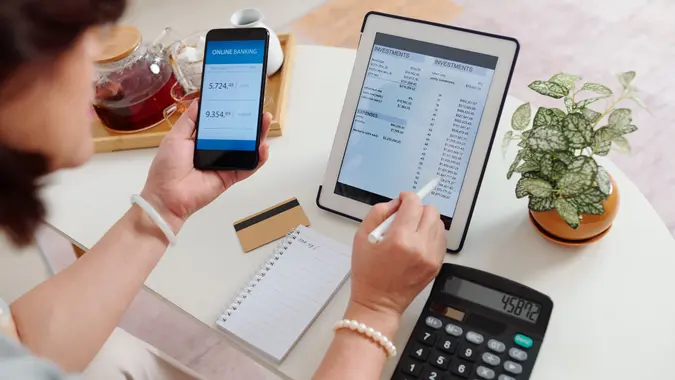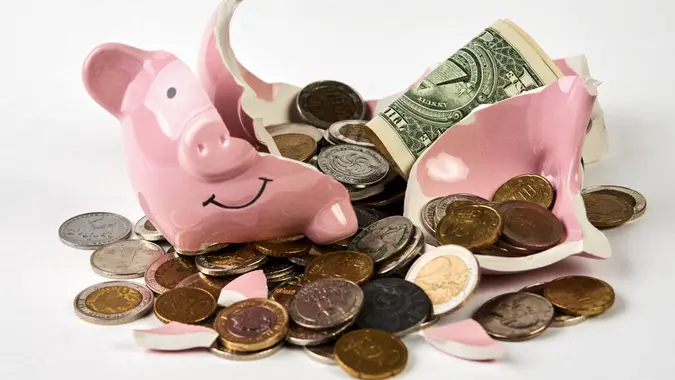What Is a Pending Transaction and How Long Does It Take?

Commitment to Our Readers
GOBankingRates' editorial team is committed to bringing you unbiased reviews and information. We use data-driven methodologies to evaluate financial products and services - our reviews and ratings are not influenced by advertisers. You can read more about our editorial guidelines and our products and services review methodology.

20 Years
Helping You Live Richer

Reviewed
by Experts

Trusted by
Millions of Readers
A pending transaction means funds in your account are earmarked and authorized for a specific transaction. However, the transaction isn’t yet fully processed or posted to your account.
Knowing how they work, how long they take to post and how to manage can help you avoid overdrafts and unexpected fees.
How To Check for a Pending Transaction in Your Account
Pending transactions can look differently on debit card and credit card transactions.
Debit Cards
For debit cards, the bank places a hold on the specific amount in your account. The hold is to ensure you have enough funds in your account to pay for the transaction. It will appear in your account as a pending transaction and reduce your available balance.
Once the merchant processes the transaction, it will appear as posted and be deducted from your account balance.
Credit Cards
A credit card pending transaction appears as a temporary charge against your available credit limit. It decreases your credit card limit, but after it’s processed, it will post to your account and be reflected in your statement balance.
5 Common Reasons Transactions Stay Pending
There are at least five reasons why your transaction still appear as pending:
- Merchant delay: Hotels, gas stations and restaurants sometimes have a delay in processing transactions since tips or additional charges may be added.
- Weekends or bank holidays: Transactions take longer outside of business days.
- High-risk transactions: Transactions involving large amounts of money may need additional verification.
- Temporary authorizations: Some vendors, like gas stations, may place a temporary hold on amounts until the transaction is completed.
- Glitches in payment systems: System malfunctions can also cause transactions to appear as pending.
What Is a Posted Transaction?
A posted transaction is when the full amount has been charged and deducted from your account. It will appear in your account transactions and be deducted from your bank balance. For credit cards, the charge will appear on your statement.
Differences Between Pending Transactions vs. Posted Transactions
| Feature | Pending Transaction | Posted Transaction |
|---|---|---|
| Status | Temporary hold | Final charge |
| How it shows up in your balance | Impacts available balance | Affects actual balance |
| Can it change? | Yes | No |
| Time frame | One to three business days | Once posted, it’s permanent |
How Does a Transaction Go From Pending to Posted?
Here are the steps that move a transaction from pending to posted:
- Once you make a payment, the merchant will request authorization from your bank or credit card company.
- Your bank’s available balance will show that amount on hold.
- With a credit card, your available credit will be reduced in the amount of the transaction. However, no money has left your account or reflected on your credit card.
- Once the merchant “settles” the transaction, it will be submitted to the payment processor.
- The payment will appear as posted once the merchant and credit card company or bank complete the transaction. The transaction will appear in your account or credit card history.
How Long Does a Transaction Stay Pending?
Generally, it can take anywhere from a few minutes to three to five business days, but the process varies from bank to bank. Weekends, federal holidays and even the type of transaction can also affect the timeline.
Types of Pending Transactions
There are many types of pending transactions, depending on how you use your account. These are some of those:
- Debit or credit card purchases: Purchases made with a debit or credit card may appear as pending until the vendor and issuing bank/credit card company settle the transaction.
- Check deposits: The bank may place a hold on a check until it clears.
- Direct deposits: Employers usually schedule payment in advance of the actual payday date. These funds will show as pending, until the bank officially credits your account.
- ACH or wire transfers: Electronic transfers can appear as pending until they are posted to your account. Wire transfers may show up more immediately.
- Gas station holds: When you pump gas, the gas station will place a hold on certain amounts until the actual or final cost of the gas is posted.
- Hotels: The final amount of your stay is charged at checkout. Until that point, the hotel has placed a hold for your stay and incidental charges.
- Online purchases: Some vendors will place a hold on your account for your purchase, but will complete the transaction only after the item has shipped.
- International purchases: Currency conversion and fraud checks will cause international purchases to appear as pending for a few more days than domestic transactions.
How Do Pending Transactions Affect Your Account Balance?
Available Balance vs. Current Balance
It’s good to know the difference between your available or current balance.
- Available balance: The current balance minus your pending transactions is your available balance.
- Current balance: This is the actual amount you can spend.
Pending transactions will reduce your available balance immediately even if they haven’t cleared your account. Your available balance will determine if a specific transaction will be able to clear your account.
Overdrafts and Insufficient Funds
You should always have a clear understanding of your available balance to avoid overdrafts and insufficient funds. Your current balance doesn’t take into account any charges that are pending.
How To Avoid Insufficient Funds in Your Account
- Keep track of your balance regularly
- Enable low-balance alerts
- Keep an appropriate cushion
What To Remember About Pending Transactions
Managing your pending payments is a way to make certain you don’t create an overdraft on your account. You should always check your available balance, track your scheduled payments and keep a money cushion so your account always has enough money.
Pending Transactions: Keep in Mind
- Online banking makes it easier to monitor account activity.
- Set up low-balance alerts, pull statements and transfer money from one account to another if necessary.
- Reviewing your transaction history consistently and knowing how some merchants process payments can help you keep your account balance with the right amount of funds.
FAQs on Pending Transactions
Have more questions about pending transactions? Check out this FAQ.- Does a pending transaction mean it will go through?
- A pending transaction will not always go through. It can be declined or reversed.
- Are pending transactions already deducted from an account?
- Yes, these transactions are deducted from your available balance, but not your current balance.
- Do pending transactions come out of your account automatically?
- Typically pending transactions are automatic, but take a few business days to appear as posted — unless the transaction is canceled.
- What does it mean when a deposit is on hold?
- The bank may still need to verify funds, and the money isn't yet fully available.
- What happens if your pending transaction says "declined?"
- If a pending transaction doesn't go through, it's usually returned to your account, and the funds are no longer earmarked for the amount of that transaction.
 Written by
Written by  Edited by
Edited by 

























